Aloe Vera Juice Benefits: A Centuries-Old Staple
Aloe is such a cool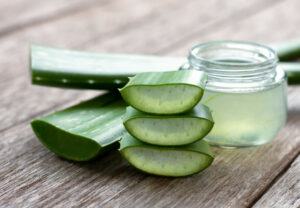 component of our natural world.
component of our natural world.
It has such a wide variety of medicinal uses and has been utilized for centuries as a staple natural remedy.
Here we will explore what aloe vera is and some of the main aloe vera juice benefits and uses.
What Is Aloe Vera?
Aloe vera is a succulent plant that has over 500 different species.
Aloe vera has firm stems/”leaves” that are filled with a gel, sometimes referred to as the “meat” of the aloe plant.
Humans began using aloe for a variety of reasons in Egypt in the 16th century, but it’s popularity grew quickly and it became used worldwide shortly after.
Various parts of the aloe plant are used for medicinal purposes as described below.
Just the gel can be used to make aloe vera products, or a combination of the outer skin and the gel.
Aloe is most often sold as a juice, gel, or in capsules as a nutritional supplement. It can be used both topically and orally.
Health Benefits and Uses of Aloe Vera
Aloe vera has a variety of benefits and uses, some of which include:
- Oral Health
Aloe vera has powerful antibacterial properties because it contains methanol. 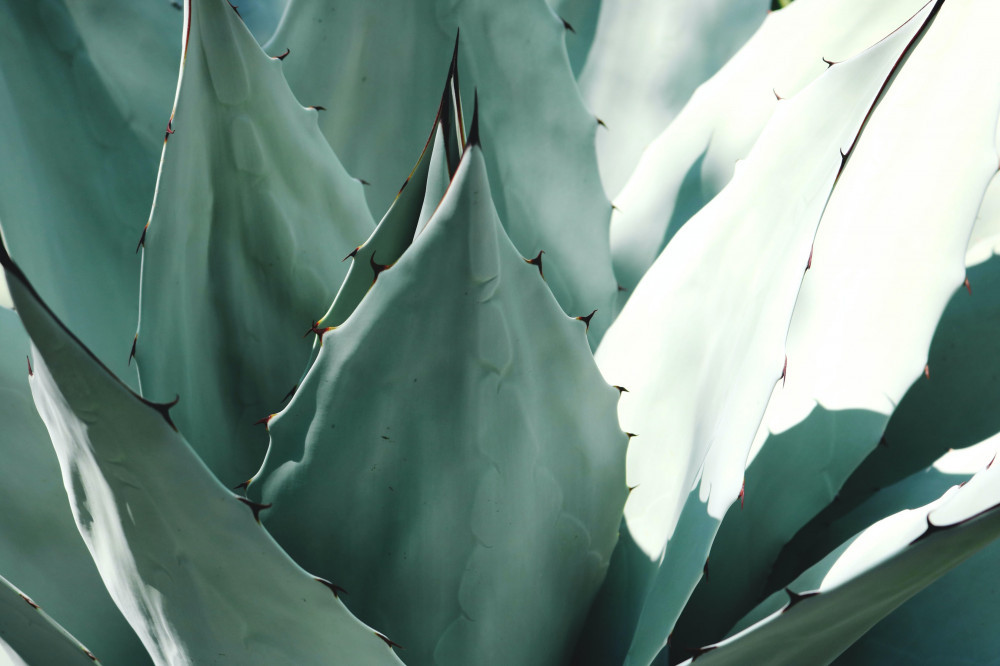 It is henceforth often used in oral care. It can help to prevent cavities by controlling cavity-forming bacteria from overgrowing.
It is henceforth often used in oral care. It can help to prevent cavities by controlling cavity-forming bacteria from overgrowing.
- Wound Healing
Aloe contains a compound called anthraquinone which has anti-inflammatory effects.
This makes it soothing to all bodily tissues, including the skin. It can be used to speed wound healing and help to reduce pain. It is also soothing for skin irritations such as rashes and boils, and can also be used on scars.
Aloe also contains glycosaminoglycans and acemannan, which are polysaccharide compounds that are thought to contribute to its wound healing capabilities.
These compounds also provide antioxidants, support brain health, and soothe the intestines.
- Skincare
Aloe is very soothing to sunburns and can help to speed up healing of the skin as mentioned previously. It is definitely a handy item to keep in your beach bag! 🙂
It is also nourishing to the skin overall because of it’s anti-inflammatory properties.
It is also moisturizing and a great part of your natural skincare routine. I use it as a toner, so I apply aloe juice with an organic cotton pad before I apply my face lotion.
In the warmer months, you can put it in the refrigerator and it is super refreshing to apply to the face when cooled.
- Antioxidant Properties
Aloe contains polyphenols, which act as antioxidants in the body. Antioxidants help lower oxidative stress, which protects your body’s tissues from damage caused by free radicals.
- Digestive Aid and Heartburn Relief
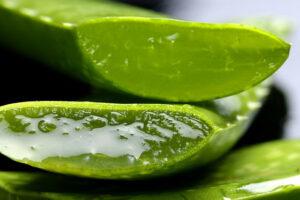
The anthraquinone compounds in aloe can also be helpful to support digestive health. This is largely due to its ability to reduce inflammation in the gastrointestinal tract.
Aloe can also help promote bowel regularity and prevent constipation.
Acid reflux, or heartburn, is when hydrochloric acid from the stomach is pushed upward into the esophagus and throat. This can be very uncomfortable and painful. Aloe may be helpful to soothe heartburn.
Throughout my own healing journey, I’ve often experienced what I refer to as a “sour stomach.” This is basically a bitter, unpleasant feeling in my stomach. Drinking aloe juice and using an aloe vera capsule supplement has always helped to soothe this.
- Balance Blood Sugar
Aloe can also help to lower blood sugar and increase insulin sensitivity.
Insulin is a hormone produced by the pancreas that helps sugar to enter our cells. If the body becomes less sensitive to insulin due to chronic intake of high amounts of sugar and other causes, conditions such as type 2 diabetes can develop.
Aloe can help to stabilize blood sugar and maintain balanced levels.
Aloe Vera Supplements
There are 2 aloe products that I’ve found and use frequently that stand out in their quality and efficacy.
These are a super convenient way to acquire the health benefits of aloe in an easy to take capsule form.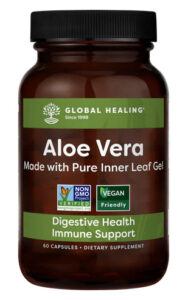
I’ve used these to help heal stomach ulcers and to soothe the “sour stomach” feeling I’ve experienced as mentioned above.
This supplement is an organic, freeze-dried powder of the gel found within aloe leaves.
It stands out due to its concentrated formulation and high acemannan content (around 15%), which is one of the most healing polysaccharide compounds found in aloe.
The freeze-drying processes helps to preserve the potency of the aloe gel, making this supplement highly bioavailable.
Dosing is always unique to the individual, but the standard dose is 1 capsule, 2 times per day on an empty stomach. I find it best to take them first thing in the morning and last thing at night.
Click here to check it out.
I’ve tried a few aloe juice products and this one has always been the best out of all of them.
The aloe used for this juice is organic and non-GMO.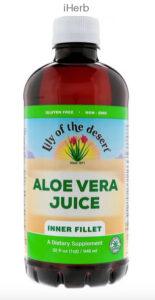 It also has concentrated levels of the polysaccharide compounds that make aloe such a powerful healing agent.
It also has concentrated levels of the polysaccharide compounds that make aloe such a powerful healing agent.
Again, dosing varies, but the standard dose is 1 to 2 ounces per day on an empty stomach, about 30 minutes before meals.
I’ve found this juice to be helpful for reducing heartburn/acid reflux as well.
This juice should be stored in the refrigerator after opening.
Click here to check it out.
You can also purchase an aloe vera plant and keep it in your home. The leaves can be plucked off and you can use the inner gel for all of aloe’s many uses. An aloe plant likes a bright, indirect light.
They require watering about every 3 weeks so they are super easy to maintain. Wait until the soil has completely dried out to water your plant again, as over watering will harm the aloe plant.
In Closing…
As we’ve explored here, aloe vera is a gentle, versatile natural remedy and is an excellent addition to many different types of healing protocols.
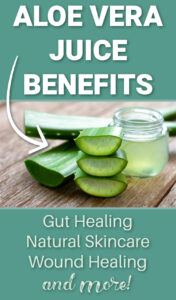
REFERENCES